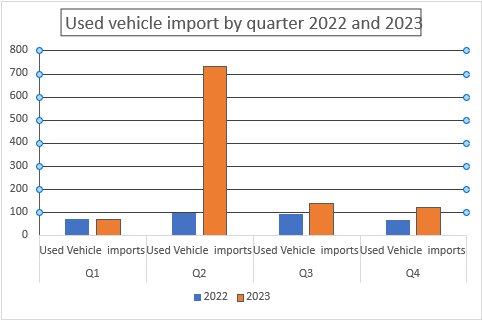The entire value of Nigeria’s used vehicle imports climbed dramatically from N325.05 billion in 2022 to N1.063 trillion in 2023, representing a 226.46% increase over a year.
Between 2022 and 2023, the value of old vehicles imported into the country increased by N736 billion, compared to 2022. This is according to the National Bureau of Statistics (NBS) 2023 foreign trade report.
The significant rise recorded in 2023 can be attributed to the huge increase in vehicle imports for Q2, 2023 at N733.91 billion representing about 69% of total imports for the year 2023.

For Q1 2022, Nigeria total used vehicle import stood at N72.32 billion, this figure decreased to N69.48 billion in the year under review.
However, in the second quarter of the 2023, there was a hike in vehicle exports from N96.76 billion recorded in 2022 to N733.91 billion.
In the third quarter of 2023, this figure dropped to N138.50 billion while that of the corresponding quarter of 2022 stood at N90.77 billion.
For the last three months of 2023, Nigeria imported used vehicles valued at N121.82 billion. This was almost double the value of vehicle import recorded in the same period of 2022 at N65.19 billion.
The automotive sector in Nigeria has seen notable development recently, yet it remains behind those in developed countries. The U.S. International Trade Administration reports that Nigeria requires 720,000 vehicles annually, but domestic production is limited to 14,000 units, necessitating the import of the remaining vehicles to meet demand.
Nigeria has experienced an upsurge in local automotive manufacture in recent years with Innoson and Nord motors, but the high cost of production stifles local demand, which is mostly supported by governments and institutions.
For the majority of Nigerians, importing secondhand cars from the United States is a more economical option. However, high import levies and the naira’s depreciation have kept costs nearly out of reach for the typical Nigerian. Nigeria primarily imports secondhand vehicles from the United States, Qatar, and Europe.
The Director-General of the Nigerian Automotive Council recently indicated that the federal government intends to prohibit the importation of secondhand vehicles manufactured between 2000 and 2007.


